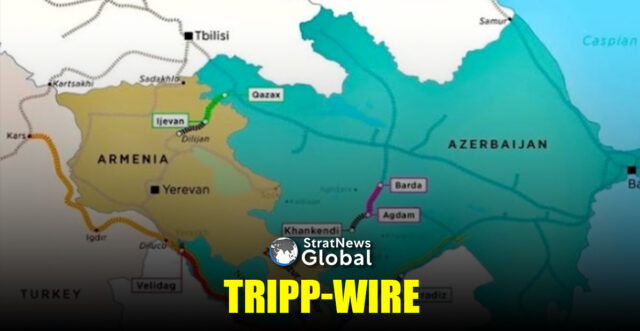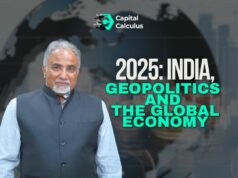Donald Trump has found a new stage—the Caucasus—and a new trick: a so-called “peace corridor” linking Armenia, Azerbaijan, and Turkey.
The Trump Regional Infrastructure Peace Project, or TRIPP, is being sold as a game-changing bridge between East and West, a pipeline to prosperity, and even the first step toward reconciliation between bitter foes. But peel back the branding, and it looks less like diplomacy and more like a century-long land lease dressed up as peace.
As analyst Stephen Blank wrote in the Central Asia-Caucasus Analyst, Trump is marketing TRIPP as his crowning foreign policy coup—the corridor that finally buries Russia’s influence and blocks Iran’s reach. Now The National reveals the kicker: Washington, through Trump’s old associate Tom Barrack, will lease the key 32-kilometre stretch of Armenian territory for up to a hundred years. Call it what you like—a corridor, a bridge, a peace project—but it smells suspiciously like a land grab.
The deal also hands control of the corridor’s rail, energy, and digital lifelines to a consortium of U.S. private companies. Armenia insists TRIPP will operate under Armenian law, and Prime Minister Nikol Pashinyan hails it as a security guarantee wrapped in an economic lifeline. But in practice it amounts to ceding the spine of the South Caucasus to American corporate landlords for the next century. “Peace through pipelines” is one thing; “peace through privatisation” is another.
For Azerbaijan, TRIPP is a masterstroke. Ambassador Vaqif Sadiqov is already calling it the route that will turn Baku into the indispensable hub between China and Europe. Oil and gas pipelines are just the start. This is about making Azerbaijan what Russia once was: the gatekeeper of Europe’s trade and energy.
Armenia, meanwhile, is gambling that giving away a century-long corridor will bring back something it has lacked since the Nagorno-Karabakh debacle: a security umbrella and a shot at economic relevance.
The timing is no accident. With the Red Sea disrupted by Houthi attacks, Russia sanctioned and distracted in Ukraine, and Iran isolated, the Caucasus suddenly matters to global supply chains. TRIPP is being spun as a lifeline for a world desperately seeking alternatives. But the corridor is less a triumph of peace than a by-product of war elsewhere.
Turkey is the other quiet winner. TRIPP could pave the way for reopening the Turkish-Armenian border — a step toward normalisation once unthinkable. If that happens, Ankara gets trade, influence, and credit for another “peace dividend”, while Trump plays impresario on the world stage.
Iran, predictably, is seething. TRIPP locks it out of a region where it once dreamed of being a transit hub. Also for Tehran, private U.S. companies running pipelines and data cables is just the CIA, with better branding.
Russia, meanwhile, has been shown the door. The deal initialled in Washington forbids any third-country troops on Armenian or Azerbaijani soil — a clause designed to eject Russian peacekeepers after 2025. The irony? It also bars U.S. soldiers, meaning Trump’s “greatest deal ever” leaves America’s own Pentagon outside the tent. Trump may crow about sidelining Moscow, but his own contract keeps his military out too.
None of this, of course, resolves the deeper fault lines.
Azerbaijan still demands Armenia rewrite its constitution to erase any lingering claim to Nagorno-Karabakh. Until that happens, the peace that Trump is selling remains hostage to constitutional amendments in Yerevan. Armenia is caught between survival today and sovereignty tomorrow. Pashinyan may talk of turning a “region of confrontation into a region of cooperation”, but that line rings hollow when cooperation is leased out for a century.
What TRIPP really represents is Trump at his purest: monetising geopolitics. It’s not diplomacy; it’s deal-making with billable miles. A corridor becomes a brand, peace becomes a franchise, and sovereignty is reduced to a 99-year lease. Washington calls it peace; Tehran calls it espionage; Moscow calls it betrayal.
For the people of Armenia and Azerbaijan, it is another reminder that their future is being traded not in parliaments, but in boardrooms.
A corridor, then, yes. A peace plan? Only if one mistakes a circus tent for a cathedral.
In a career spanning three decades and counting, Ramananda (Ram to his friends) has been the foreign editor of The Telegraph, Outlook Magazine and the New Indian Express. He helped set up rediff.com’s editorial operations in San Jose and New York, helmed sify.com, and was the founder editor of India.com.
His work has featured in national and international publications like the Al Jazeera Centre for Studies, Global Times and Ashahi Shimbun. But his one constant over all these years, he says, has been the attempt to understand rising India’s place in the world.
He can rustle up a mean salad, his oil-less pepper chicken is to die for, and all it takes is some beer and rhythm and blues to rock his soul.
Talk to him about foreign and strategic affairs, media, South Asia, China, and of course India.





